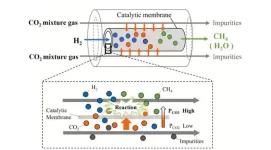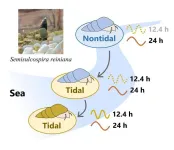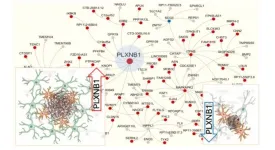(Press-News.org) Feeding children peanuts regularly from infancy to age five reduced the rate of peanut allergy in adolescence by 71%, even after many years when the children ate or avoided peanut as desired.
The new findings provide conclusive evidence that introducing peanuts into babies’ diets early will achieve long-term prevention of peanut allergy.
Lead investigator Professor Gideon Lack from King’s College London said: “Decades of advice to avoid peanuts has made parents fearful of introducing peanuts at an early age. The evidence is clear that early introduction of peanut in infancy induces long term tolerance and protects children from allergy well into adolescence. This simple intervention will make a remarkable difference to future generations and see peanut allergies plummet.”
Results from the LEAP-Trio trial are published today in the NEJM Evidence by researchers from King’s College London and sponsored and co-funded by the US National Institutes of Health’s National Institute of Allergy and Infectious Diseases (NIAID).
Peanut allergy is rising in Western countries. The prevalence of peanut allergy is about 2% in young children in North America, UK, Western Europe, and Australia. For some, even small amounts of peanuts can lead to a life-threatening allergic reaction. This, as well as conflicting advice, has made parents and caregivers fearful of introducing peanuts into diets.
The new research findings come from the LEAP-Trio study, building on the results of the Learning Early About Peanut Allergy (LEAP) clinical trial. In the first trial, half of the participants were asked to regularly consume peanut from infancy until age 5 years, while the other half were asked to avoid peanuts during that period. Researchers found that early introduction of peanut reduced the risk of peanut allergy at age 5 by 81%.
The investigators followed up both groups from age 6 to age 12 or older. In that period, children could choose to eat peanut in whatever amount and frequency they wanted. They found that 15.4% of participants from the early childhood peanut-avoidance group and 4.4% from the early childhood peanut-consumption group had peanut allergy at age 12 or older. These results show that regular, early peanut consumption reduce the risk of peanut allergy in adolescence by 71% compared to early peanut avoidance.
Professor George Du Toit, Co-Lead Investigator from King’s College London said: “This is a safe and highly effective intervention which can be implemented as early as 4 months of age. The infant needs to be developmentally ready to start weaning and peanut should be introduced as a soft pureed paste or as peanut puffs.”
The researchers also found that although participants in the LEAP peanut-consumption group ate more peanut throughout childhood than the other participants overall, the frequency and amount of peanut consumed varied widely in both groups and included periods of not eating peanut. This shows that the protective effect of early peanut consumption lasts without the need to consistently eat peanut products throughout childhood and early adolescence.
The LEAP-Trio study team tested the adolescents for peanut allergy primarily through an oral food challenge. This involved giving participants gradually increasing amounts of peanut in a carefully controlled setting to determine if they could safely consume at least 5 grams of peanut, the equivalent of more than 20 peanuts. The study team also surveyed participants about their recent patterns of peanut consumption and verified the self-reports through measurements of peanut in dust from participants’ beds, a technique previously validated by LEAP investigators.
Professor Lack, who is the Head of the Children’s Allergy Service at Guy’s and St Thomas’ NHS Foundation Trust, added: “Early consumption of peanut will prevent more than 100,000 new cases of peanut allergy every year worldwide.”
END
Feeding infants peanut products protects against allergy into adolescence
2024-05-27
ELSE PRESS RELEASES FROM THIS DATE:
Who will like beetle skewers? What Europeans think about alternative protein food
2024-05-27
Why do people in Paris like seaweed and tofu salad? Will Italians be tempted to try a beetle skewer? How many young Polish consumers are "food innovators", eager to eat chickpea pâté? In an international project, researchers from SWPS University analysed European consumers' attitudes towards alternative protein food products.
In the face of the fight against climate change, more and more people are modifying their diets, giving up or limiting conventional sources of protein (e.g., beef, pork, poultry, and animal dairy) in favour of those with a lower environmental impact. These are the so-called alternative protein food (APF) products, which may be based on ...
ETRI wins ‘iF Design Award’ for mobile collaborative robot
2024-05-27
ETRI research team has won a main prize at the German International Design Competition, one of the top three design award competitions in the world. This signifies global recognition of our research team’s technology.
Electronics and Telecommunications Research Institute (ETRI) announced that its Teach Pendant software for the autonomous mobile collaborative robot (MOBY1)) won the main prize in the User Experience (UX2)) category at the ‘iF Design Award 20243)’, an international design competition in Germany.
1) MOBY: Equipped with the AI-based vision solution ‘IndyEye’ and the ...
Combating carbon footprint: novel reactor system converts carbon dioxide into usable fuel
2024-05-27
Reducing carbon emissions from small-scale combustion systems, such as boilers and other industrial equipment, is a key step towards building a more sustainable, carbon-neutral future. Boilers are widely used across various industries for essential processes like heating, steam generation, and power production, making them significant contributors to greenhouse gas emissions.
Boilers are generally quite efficient. As a result, it is difficult to reduce CO2 emissions simply by improving the combustion efficiency. Therefore, researchers are exploring alternative approaches to mitigating the environmental ...
Investigating the origin of circatidal rhythms in freshwater snails
2024-05-27
Organisms, including humans, follow a schedule that coordinates important bodily functions such as sleep-wake cycles, metabolism, hormone production, cognitive function, and feeding habits to environmental cycles. While most organisms possess circadian rhythms synchronized with the 24-hour day-night cycle, they have also developed other internal clocks to suit their local environments. Marine animals have evolved circatidal rhythms, aligning activities with the 12.4-hour tidal cycle, complementing circadian rhythms.
Researchers from Chiba University have discovered that snails living in downstream tidal areas have biological ...
Altering cellular interactions around amyloid plaques may offer novel Alzheimer’s treatment strategies
2024-05-27
New York City, [May 27, 2024] – Researchers at the Icahn School of Medicine at Mount Sinai have made a significant breakthrough in Alzheimer’s disease research by identifying a novel way to potentially slow down or even halt disease progression. The study, which focuses on the role of reactive astrocytes and the plexin-B1 protein in Alzheimer's pathophysiology, provides crucial insights into brain cell communication and opens the door to innovative treatment strategies. It was published in Nature Neuroscience (DOI 10.1038/s41593-024-01664-w) on May 27.
This groundbreaking work is centered ...
Brain damage reveals part of the brain necessary for helping others
2024-05-27
Our willingness to help others is governed by a specific brain region pinpointed by researchers in a study of patients with brain damage to that region.
Learning about where in the brain ‘helping’ decisions are made is important for understanding how people might be motivated to tackle large global challenges, such as climate change, infectious disease and international conflict. It is also essential for finding new approaches to treating disorders of social interactions.
The study, ...
Surprising properties of elastic turbulence discovered
2024-05-27
Blood, lymph fluid and other biological liquids can have surprising and sometimes troubling properties. Many of these biological solutions are non-Newtonian fluids, a type of liquid that is characterized by a non-linear relationship between stress and strain. Consequently, non-Newtonian fluids don’t necessarily behave as one would expect from a liquid. For example, some of these peculiar fluids deform when touched lightly but will act almost as a solid when a strong force is applied.
And biological ...
Study assesses cancer-related care at US hospitals predominantly serving minority populations compared with non-minority serving hospitals
2024-05-27
It’s important to ensure that care provided at US hospitals that predominantly serve Black and Hispanic populations is as high-quality as the care provided at other US hospitals. New research reveals significant disparities in the delivery of cancer-related care at minority serving hospitals (MSHs) compared with non-MSHs, however. The findings are published by Wiley online in CANCER, a peer-reviewed journal of the American Cancer Society.
For the study, investigators analyzed information from the National Cancer Database (which accrues approximately 70% of US cancer diagnoses) to identify patients eligible for definitive ...
First in-human investigator-initiated clinical trial to launch for refractory prostate cancer patients: Novel alpha therapy targets prostate-specific membrane antigen
2024-05-27
Osaka, Japan - A research team at Osaka University will start an investigator-initiated clinical trial for refractory prostate cancer patients after successful development of a new alpha-ray therapeutic agent ([At-211] PSMA-5) and confirmation of its efficacy in animal models. This will be a world-first in-human clinical trial with [At-211] PSMA-5.
Prostate cancer is on the rise worldwide and is the most commonly diagnosed new cancer in men in Japan. Various treatments are offered for prostate cancer, but the prognosis is very poor when the disease is resistant to standard treatment and associated with multiple metastases.
In ...
Will generative AI change the way universities communicate?
2024-05-27
Since the launch of ChatGPT 3 in November 2022, we've been abuzz with talk of artificial intelligence: is it an unprecedented opportunity, or will it rob everyone of jobs and creativity? As we debate on social media (and perhaps use ChatGPT almost daily), generative AIs have also entered the arena of university communication. These tools—based on “Large Language Models” that were optimized for interactive communication—can indeed support, expand, and innovate university communication ...





